The Society of the Muslim Brothers, or Muslim Brotherhood, was founded in Egypt in 1928 with the goal of helping those in need. Nonetheless, they had another secret objective: to rebuild the caliphate, which was dissolved after the Ottoman Empire collapsed. As civil society is very active in the Muslim world, even for a short time, they seized power in Egypt.
We speak to Florence Bergeaud-Blackler, a French expert and author on the subject, about the spread of the Brotherhood in Europe – and in France in particular – and its growing influence in local Muslim communities. Florence has a PhD from the University of Bordeaux in Anthropology, and she is a researcher at the Centre National de la Recherche Scientifique (CNRS). She also works at the Groupe Sociétés Religions Laïcité (GSRL) laboratory, a joint EPHE/CNRS research unit, on the Condorcet campus of the Paris Sciences et Lettres University (Aubervilliers). Her work focuses on issues of Islamic normativity in secularised societies, the halal market and the growing influence of the Muslim Brotherhood in Europe.
In 2024, she created the CERIF (European Centre for Research and Information on Frérisme), co-organiser of the May 15th international scientific symposium in Paris on Islamisms in Europe.
Pleaese tell me about yourself: why did you choose Islamism as a subject for research?
I started working in aeronautics, in IT, for about five or six years. Then I got bored and started studying anthropology. I chose the subject of Islam in local region of France, a subject that at the time, in 1993, had not been studied at all, even though Muslims had been present in France since the 1970s.
And why the Brotherhood of Islam became your subject?
At the early ‘90s a study had just been published by Gilles Kepel, entitled Les banlieues de l’Islam, which showed for the first time that not only was Islam present in France, but so was Islamism.
There was Islam, as a religion still seeking its place, and almost immediately Islamism, which is a politico-religious movement that has tried to pass itself off as the only possible Islam. It was in my last book, Le Frérisme et ses réseaux : L’Enquête, that I tried to define the development of Islamism in a European secular liberal context. I have called this ideology “Brotherism”.
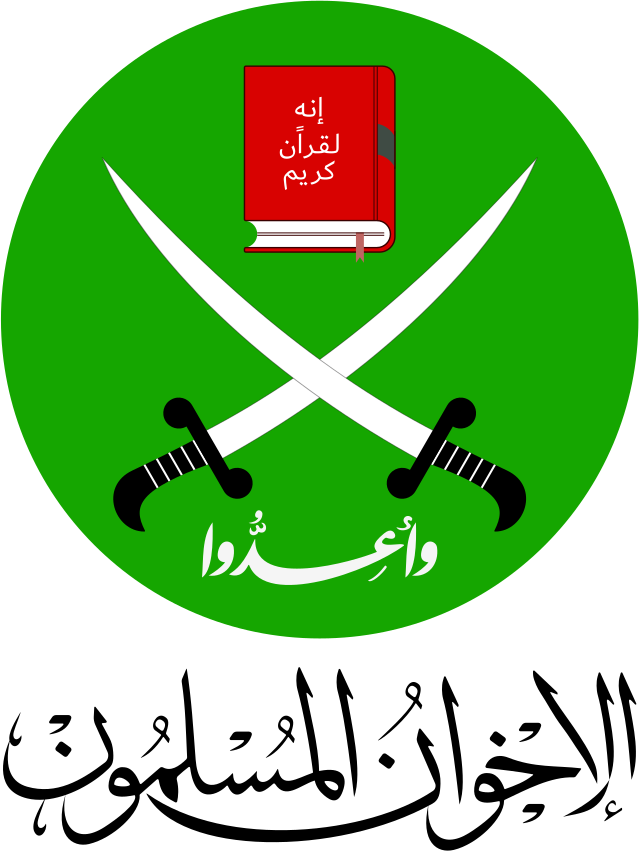
Muslim_Brotherhood_Emblem (Source: Wikipedia Commons)
Can the title of your book be translated as The society of Brotherism?
Even if I describe certain structures, I deal mainly with the ideology of the Muslim Brotherhood.
What I call “Brotherism” is the ideology that emerged from the evolution of the Muslim Brotherhood in a secular context over half a century.
In this context, this ideology and its impact have not been studied until very recently. In France, my book was like a bombshell when it came out, because until then the vast majority of my academic colleagues claimed that the Brotherhood didn’t exist in Europe, that it was just conservatism.
But it’s not conservatism, because it’s a modern movement following God’s plan to establish the Ummah throughout the world. It has a vision, an identity and a plan. The Brotherhood, which is the driving force behind this movement, remains perfectly secretive because it knows that this theocratic project is unacceptable in a democracy.
The Brotherhood would have us believe that they are harmless. If we look at their origins, when they were founded in Egypt, they were a social movement to help the poor. But I think they were more than that.
They present themselves as a Charity is how, especially when they were born in 1928, created by Hassan al-Bana. But of course, they already had plans to build the caliphate. They started in Egypt, but they always had in mind the means of spreading this ideology throughout the world. The Europeans thought that they would abandon this ideology when they arrived in Europe, but that’s not the case. They can’t say what they are and what they want because it’s too subversive. So they resort to lies and deception.
Submission and Physiological Jihad
Do they follow the main teachings of Islam to extend the Islamic community through preaching, education, example and writing? In this context, does jihad also include the right, indeed the obligation, to defend Islam and the community against all aggression?
Yes, and in the European environment, they don’t use physical violence but rather psychological one because physical violence is ineffective unless the balance of power is favorable. Consequently, they use influence and infiltration, and by this very discreet means they are able to influence, first of all, the Muslim population so that it influences the whole population, to make our societies “Sharia-compatible”.
What does it mean to be compatible with Sharia law?
The idea is not to impose Sharia law, but to make society compatible with Muslim law.
When the environment is sufficiently tamed, they believe that Europeans will naturally come to accept its rules. They will believe that Islam is the best of all religions.
In other words, must conversion to Islam be a voluntary act? In this context, do they want to wage jihad?
Jihad means war, but it can be waged with physical, intellectual, or emotional weapons. For the moment, it’s a soft jihad, a soft power through culture, the economy, legal means, and so on.
What about their links with other Islamic political groups with similar objectives, such as the Brotherhood, for example, or the Islamic fundamentalists?
The Brotherhood are Salafists in the sense that they have a literalist, legalistic, dogmatic and fundamentalist conception of Islam. They want to be the driving force behind the different currents of Islam, and their aim is to guide them towards the Caliphate. The Brotherhood hates fitna (dissension in the community) and wants to be friends of all the fundamentalist groups to get them moving in the same direction, towards a modern, globalised Islamic society. They use jihadists as well as Sufists and liberals.
Are they also opposed to liberal Muslim movements, like Euro Islam?
The Brotherhood do not want any Muslim to escape their control. So you can be what you are as a Muslim, liberal, or Sufi. But you must act for Islamic society, whatever your sensibilities, whatever your personal inclinations. The mentor of the European Brotherhood, Youssef al-Qaradawi, calls it an “Islamic movement”.
Many Muslim countries have designated them as a terrorist group. Is it because they see them as rivals for power?
Exactly. The main conflict between the Islamic nation-states and the Muslim Brotherhood is that the latter is opposed to any state structure. For them, there is only one nation, the Ummah, the “Islamic nation”.
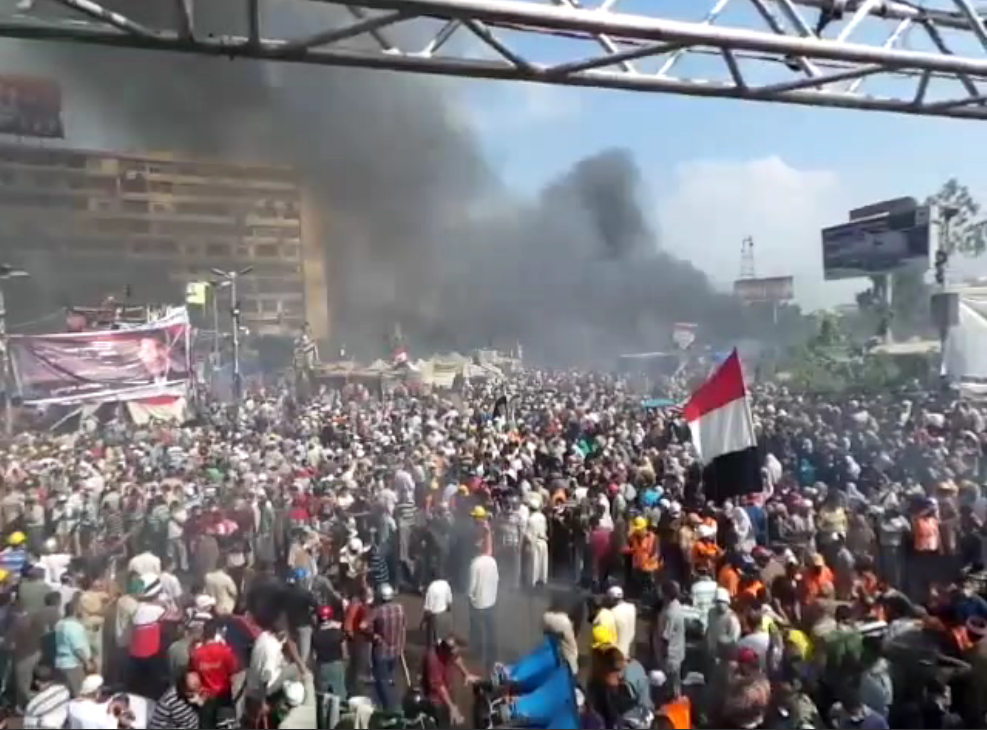
Rabaa el-Adaweya Square during the dispersal of the pro-Morsi sit-in in 2014 (Source: Wikipedia Commons)
Halal Market – A Commercialised Islamism?
Speaking of their organisation, you have also published a book on the global halal market, which is also linked to them.
When I wrote my book Le marché halal ou l’invention de la tradition (2017), I wasn’t writing about the Brotherhood. Although I had always seen and studied close to them for 30 years, I didn’t have the right tools to forge the concepts I developed in my latest book.
I started to study them closely, then the brothers banned me from the field. They do this with all researchers and academics who don’t go their way.
They supervise them and if they escape, they spread the rumour that these researchers are working for the police. That’s what happened to me (Florence herself received death threats on social media in 2023). Luckily, even though I could no longer work with the families in my field, I discovered how the Brotherhood thought and acted by studying the halal market and Islamic norms, a very ‘Islamophile’ field.
When they arrived in Europe, the Brothers maintained their norms by combining them with the local normative framework. The norm of the capitalist and neo-liberal halal market is a magnificent illustration of this.
It took me many years to make the link between activities linked to Islamic standards and the influence of the Muslim Brotherhood in society.
Do they have other means? Does the Brotherhood collect money from Muslims as a kind of tax?
Halal allows a tax to be levied. The model is copied from kosher. Thanks to this system, the Jewish diaspora has survived through the centuries. The Brotherhood copied this system to create a separation, not to survive, like the Jews, as a persecuted minority.
The Brotherhood do not control meat production, food, banking, tourism or modest fashion. They present themselves as marketing and certification agencies and thus influence standards of behaviour in food, clothing and consumption.
They spread the word that halal was not Islamic enough, and the Muslim population wanted more and more guarantees. They presented themselves as the guarantors. The halal market is not just a question of money, it’s also a question of determining behaviour and defining culture. Money is important, of course, but I think the influence on the halal market is more cultural than economic.
Who is the current leader of the Fraternity in Europe and France? Is there a designated leader for each country?
There is not just one leader, there are hierarchical structures under the umbrella of the Union of Islamic Organisations in Europe, and in France the Union des organisations islamiques de France (UOIF). This organisation recently changed its name to Musulmans de France. The two main ideologues are the Egyptian Yusuf al-Qaradawi and the Pakistani Abul A’la Maududi.
Drugs Trafficking, Immigration, and Integrational Collusions – the Brothers Behind it All?
I’d like to talk about Muslim societies in France and their integration problems, which have been in the news for over a decade. On the no-go zones in Paris and Marseille. What is the link between Islamist extremists and the Brotherhood?
We need to distinguish between jihadism and the Brotherhood. Jihadism is a means, not the only one, for the Brotherhood.
Aren’t they also linked to the serious drug situation in the suburbs?
They are not directly linked, although there may be alliances between the two in certain areas. The Muslim Brotherhood is an opportunist movement that supports all subversive movements that help France to collapse. When there is a crisis that shows the collapse of the democratic model, that suits them.
How do you see the fight against urban ghettoisation? It is more than the issue of poverty, it’s the problem of integration as a whole that is at stake. In this context, how do you see the future?
We cannot lose the war being waged against us by the Islamists, who are taking Muslims hostage. Otherwise, we will be lost, and our democracy will no longer exist. Until now, and particularly before the publication of my book, we used to talk about radicalism. But with this vocabulary designating an ideology “the Brotherhood”, we have the tools to think differently, and to see that we are dealing with a low-intensity war that has been constant for 35 years. We need to think about the Muslim Brotherhood not just in terms of conversion, but also to understand how they think and what they want us to be, how they want us to work for them. We don’t realise that we have been changed. I think the decision-makers have heard my argument, because the report launched by the Minister of the Interior has taken up my Sharia-compatible formula. So that’s a good thing. If we see the problem, maybe we’ll get rid of it. But it will take time, of course.
But from a politician’s point of view, they see Muslims as a group of voters. What do the main parties think? How are they dealing with the problem of immigration and the integration of Muslims? It’s clear that Marine Le Pen is an anti-Islamist, and some consider her to be Islamophobic. For this reason, she has not been able to break the “cordon sanitaire” until now. Will this change?
Le Pen, father and daughter, has been demonised in the political sphere. But her party has become very popular and it is almost certain that the Rassemblement National will win the European elections in 2024. The strategy of demonisation no longer works. The main problem is that the far-right and populist parties are turning Islamisation into a political challenge that is highly divisive. But all the political parties should be working together, because this is a war against France and Europe.
Let’s talk about liberal Islam. It’s hard to imagine, but there is a liberal movement within Islamism and there are Muslims who hold liberal views. There is a movement called Euro Islam. What do you think of it?
I don’t know of any liberal Islam in France today. It’s been 20 years since the Muslim Brotherhood swallowed this intellectual and fragile trend. Twenty years ago, the representative of the Grand Mosque of Paris said: “The hijab is not compulsory”. Today, nobody says that any more. It’s the influence of the Brotherhood, and of Salafism in general.
My last topic concerns a very current issue: the student demonstrations in French universities in support of Palestine. Do you think there is a link with the Brotherhood?
Of course, there are some. These are the Brotherist networks that are active in all the universities. Iran, of course, has power and influence, but the people protesting here are Sunnis, and the Muslim Brotherhood is a Sunni organisation. In France, Qatar is powerful, exerting great influence through culture and money.
Police in Paris entered France’s prestigious Sciences Po university and removed student activists who had occupied its buildings overnight in protest against Israel’s conduct in its war against Hamas in Gaza https://t.co/tq7NDYdT9n pic.twitter.com/Y70PapyADm
— Reuters (@Reuters) May 3, 2024
Yes, we know about the controversial purchasing of the popular Paris Saint Germain football club.
They did more than that. They also conducted research, influencing the social sciences for 30 years.
What do you think of the outcome of the demonstrations? I’ve heard that some supporters are considering converting or have already converted to Islam.
Maybe… I don’t know. I do know that only a minority of students are demonstrating. And half of the demonstrators are not from the university at all. If you have 100 demonstrators, you have 50 people from outside and 50 people from inside, out of more than 3 000 students, that’s not much.
The problem is not the numbers. When you think of the case of Samuel Paty, the teacher who was murdered and decapitated , the impact has been considerable. Now 60 or 70 percent of teachers don’t teach certain subjects because they can’t bear the thought of this abominable murder. Therefore with one murder, one beheading, you can influence 100 000 people.
Finally, I would like to say a few words about the major event you are organising: the international conference on Islamisms in Europe, to be held in Paris on 15 May.
For this event, the very first conference on Islamists in Europe, with some of the best specialists from all over Europe. In France, there are two or three of us working on this subject, which is ridiculously low. If you’re interested, you can find out all about Islamism in Europe at website of the event.

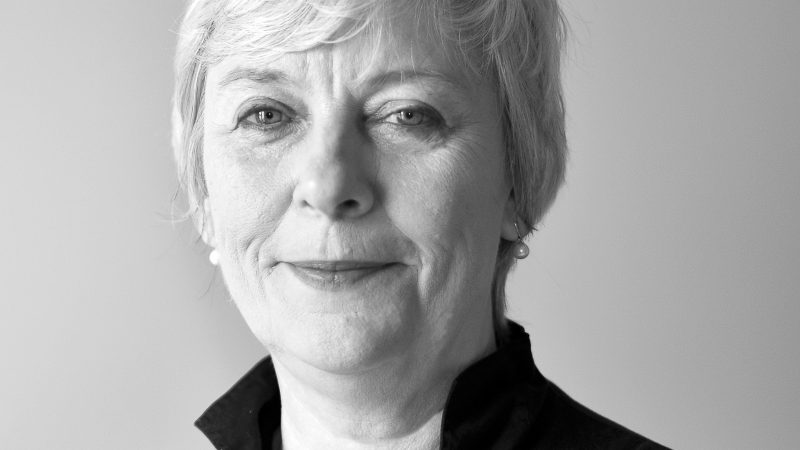
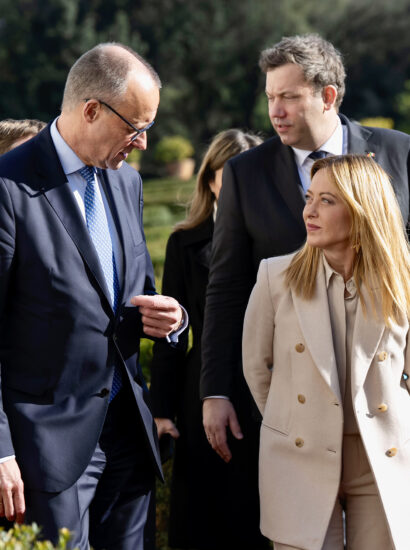

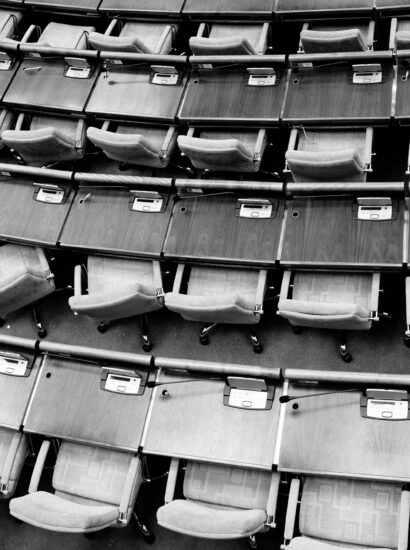
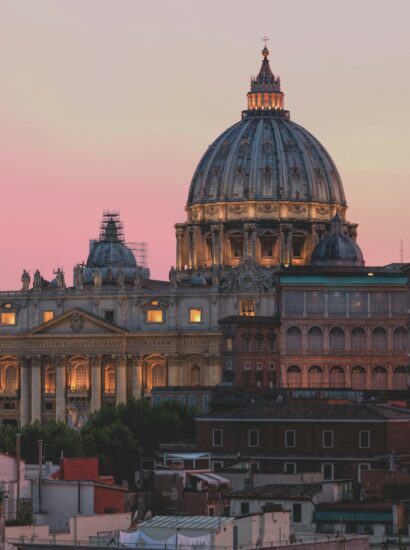


[…] for Le Pen in France, as they believe that she has the right message, as they believe that Muslims pose a greater threat to their […]